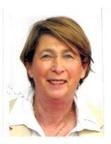Dorothea Shefer-Vanson's Blog, page 6
August 18, 2024
Montry Python Speaks! The Complete Oral History
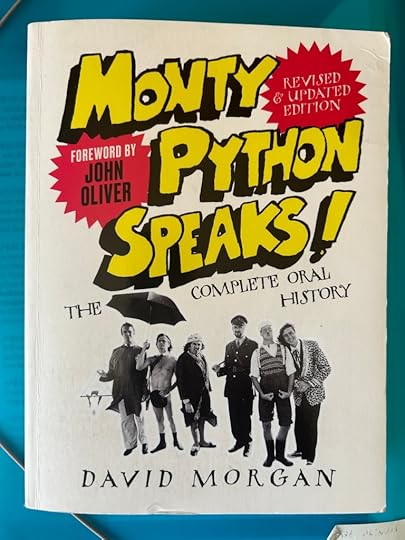
David Morgan, the author of this book, has studied the history of the six men who, apart from the one American member, Terry Gilliam, were students at Cambridge and Oxford and were active in the drama societies of their respective universities. After graudating they began, as individuals or in twos and threes, to create skits and sketches for various television programmes. To produce this book the author has viewed all the programmes and films made by the members of the group, either together or individually, and has interviewed its five surviving members – John Cleese, Eric Idle, Michael Palon, Terry Jones and Terry Gilliam, the last being the illustrator and the only American in the group. One of the original members, Graham Chapman, died in 1989, following a struggle with alcoholism.
The book does its best to follow the rather erratic development of the comedy group, under the auspices of the BBC’s Light Entertainment programme, starting by acknowledging their debt to a zany radio show, The Goon Show, aired by the BBC in the 1950s and early 1960s, featuring Spike Milligan, Harry Secombe, Peter Sellers and myriad sound effects. The whacky comedy of the Monty Python group developed from the comedic writing and acting talents of all six original members of the group. Each of the interviewees explains in turn how they came up with the name of the group and how they were encouraged by the BBC to put together a series of comic skits and create a programme, and then a series for television.
The comedy created by the group consisted of a quirky assemblage of stream of consciousness nonsense, satire, sex and violence, and the mark they made on popular culture is still felt today. Their shows, which began to be broadcast in 1969 and continued until 1974, were characterized by a complete lack of predictability and a total departure from the sit-com formula of most other television comedy programmes. In the series, which lasted for forty-five episodes, all six members of the troupe were both writers and comedians.
As a writing and performing group, they went on to create films, most prominent among them being And Now for Something Completely Different (1971), Monty Python and the Holy Grail (1975) and Life of Brian (1979). At a later stage individual members created their own works. Thus, John Cleese wrote and acted in his television comedy series Fawlty Towers and the film A Fish Called Wanda, as well as numerous commercials; Eric Idle wrote and directed the musical show and film Monty Python’s Spamalot and wrote a novel The Road to Mars. Graham Chapman wrote A Liar’s Autobiography; Terry Jones (‘most likely of the Pythons to appear in drag’) has written about Chaucer and hosted the documentaries Ancient Inventions, The Crusades and Barbarians. Michael Palin has travelled just about everywhere and made entertaining and informative TV documentary programmes of his travels, and has also written two novels, Hemingway’s Chair and The Truth.
Despite the fact that each member of the group has developed his own individual career, they have managed to get together occasionally for TV performances and interviews and, most notably in 2014, for a series of five ‘farewell’ performances at London’s massive O2 arena, which seats an audience of 16,000. Although their acting talent was still in evidence, the effect of time and ageing could not be disguised. Nonetheless, this performance was achieved at a time when they were all well into their seventies and Terry Jones was battling the initial symptoms of dementia. The book ends by noting that their takings from those shows were sufficient to offset the losses they had incurred along the way due to mismanagement and legal penalties and fees.
August 13, 2024
Love in the Blitz: The Long-Lost Letters of a Brilliant Young Woman to her Beloved on the Front
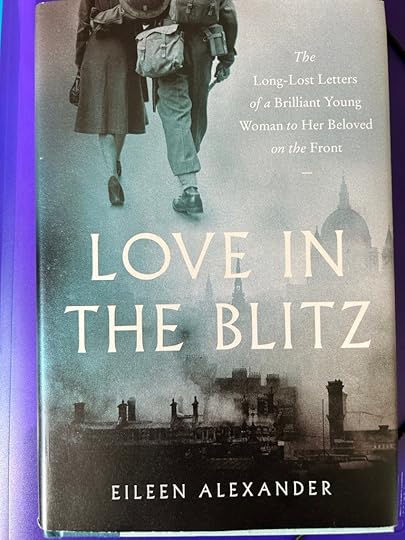
I ordered this book by Eileen Alexander from Bibliophile (which sends me a monthly newsletter of books on offer) because the period of the Blitz (the bombing of London in WWII) is a time that interests me. It was there at that time that my parents found refuge from Nazi Germany, and also when I was born.
I had expected to read a personal account of what it was like to live at that time, though I already had a pretty good idea of events from various sources. But I was totally gobsmacked when I read in the foreword that Eileen Alexander came from a wealthy Jewish family and that the name of her ‘beloved’ was Gershon Ellenbogen, another Jew. It seems that the two were contempories at Cambridge University, graduating in 1939, she with a first in English and he in Law.
The letters begin in the summer of 1939 with a reference to a trial brought by the Crown against Gershon Ellenbogen for dangerous driving. It seems that he had been driving Eileen in her car (affectionately known as ‘Semiramis’) from Cambridge to London when they had crashed into another car, causing Eileen to be injured, while he was only lightly hurt. Her first letter constitutes a calm and reasoned argument exonerating him from blame for the accident. While Eileen was recovering in hospital and subsequently at her family’s summer home in Scotland, she wrote him frequent letters, usually in a friendly but fairly impersonal tone, describing the course of her recovery, her family’s activities, her squabbles with her parents and her two younger brothers, peppering her account with quotes from Shakespeare and other scions of English literature, as was only fitting for someone who had graduated with a first in English from Cambridge (and for which the editors have kindly provided sources).
As war looms ever nearer, the events in the global arena begin to impinge on Eileen’s letters to Gershon. She feels obliged to abandon her intention of pursuing further research at Cambridge, instead offering herself for war work. It is at this stage that her relations with Gershon become more intimate, and they call one another ‘darling.’ She writes hoping that he is too short-sighted to be of much use to the British Army. She has her photo taken, at his request, and even commits the phrase ‘I love you better than my country’ to paper while also describing the comings and goings of mutual friends, many of them former Cambridge colleagues. One of these is ‘Aubrey’ (later to become a prominent voice for Israel as Abba Eban), and references to Zionism and Judaism occasionally crop up in their correspondence.. Eileen’s letters begin to come thick and fast, on an almost daily basis, as she describes the process of her attempts to find employment in war work, and terms such as ‘darling’ and ‘my dear love’ become ever more frequent. She reveals to him that when she mentions ‘Duncan’ all her friends know that she needs to use the lavatory (reference to ‘Wake Duncan with thy knocking’ from Macbeth). Gershon’s letters have not survived, but he evidently replied frequently, affectionately and at length to hers.
As war breaks out and Gershon is called up to serve in intelligence, first in another part of England and later in Cairo, Eileen’s letters become an almost daily occurrence. She puts down on paper in graphic and erudite detail her feelings, her activities, her meetings with friends, her conversations and arguments with her brothers and her parents. She has a keen eye and an eloquent pen and is able to bring the various individuals with whom she comes into contact vividly to life. War-time restrictions meant that correspondents had to cram as many words as possible onto an air-letter form, and she manages to reduce her writing to such tiny dimensions that she can get 350 words onto a page while Gershon manages only 200. She describes the effects of the bombing, and at one point declines to seek shelter in the overcrowded and claustrophobic shelters, preferring to remain in bed.
As the war goes on it is evident that the separation becomes increasingly painful for Eileen. After Gershon finally proposes to her during a brief leave her letters overflow with blandishments and endearments, so that her vivid account of her longing for him and the suffering this entails becomes the overriding theme of her letters. I have never in literature come across such an outpouring of love and longing, but we must remember that these are personal, extraordinarily intimate, letters. making any other expression of love seem to pale by comparison. Luckily the photos included in the book reassure the reader that Gershon and Eileen’s love story had a happy ending, and they were finally married (at St. John’s Wood Synagogue in March 1944). Upon finishing this book I felt that I had been given an insight into the intimate life and desolation of a young couple separated by war, and I fear that too many such separations did not end so happily, and that some are still occurring.
August 6, 2024
From Bachfest to Bookfest
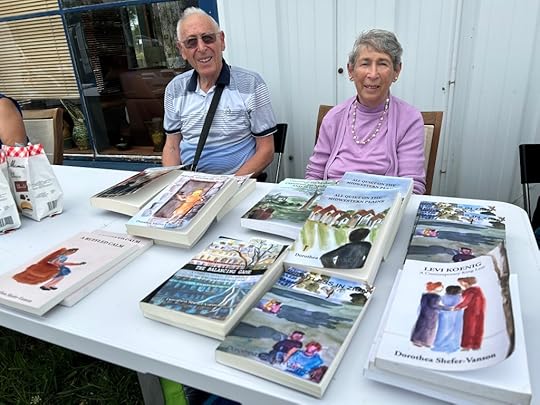
It seems hardly imaginable, but just over a month ago we were in Leipzig, enjoying the music of Bach and drinking in the ambience of that ancient city, which has known many vicissitudes, concluding with its incorporation into the Soviet-controlled DDR until the fall of the Berlin wall in 1989. And now, here we are in rural France, with its tranquil atmosphere, while we read the news with anxious eyes, concerned about our home and loved ones in Israel.
But here all is peaceful and green, with fields and trees as far as the eye can see. I was lucky enough to be able to participate in the first annual Bookfest, held in the nearby village of Gouzon and organized by two enterprising young women, Judi Alexander Castille and Vicky Eveleigh. The event enabled authors to display and sell their books, and also to give a reading to the assembled audience.
So we arrived early at the site and were able to set out our wares (the eight novels I have written and published to date), and await the arrival of the other authors and the audience of book-lovers. In addition to the ten participating writers there was a food truck providing hot food and a cake stall, so nobody would go hungry. Hundreds of second-hand books were also on sale, and therer was a constant coming and going of eager bookish people.
At set intervals individual authors gave readings from their books, and this provided an insight into the different imaginations and genres that seem to have captured the minds of the writers in attendance, most of them in English. I was particularly fascinated by the French writer, Anna Cazine, who confessed to being fascinated by Agatha Christie and the British royal family, leading her to write a mystery entitled ‘Enquete royal a Buckingham,’ which I was tempted to buy, but missed my opportunity. The subjects about which other authors had written included childhood memories in dilapilated British cities, an accunt of a sixteenth century witch who returns to haunt people in the twentieth century and help women who have been wronged. Sarah Gunn, who teaches and writes about IT, read out a story she had written about the other side of a fairy tale as the result of a ‘writing prompt.’ Kate Rose read a few of her touching poems and Greg Shapiro read and performed from his book, ‘The American Netherlander,’ and had us all in fits of laughter.
When my turn came I sat myself down at the reading table and did my best to bring to life the segment of one of the chapters of my book,’Chasing Dreams and Flies; a Tragicomedy of Life in France,’ and was told afterwards that I got a good response from the audience, which laughed in the right places and applauded politely at the end (as they did for everyone).
The event was both enjoyable and profitable, and we went home a few books lighter and with a sense of satisfaction at having been able to meet and mingle with so many like-minded people. I can hardly wait for next year’s Bookfest, at the same time and place.
July 30, 2024
Madame Proust and the Kosher Kitchen
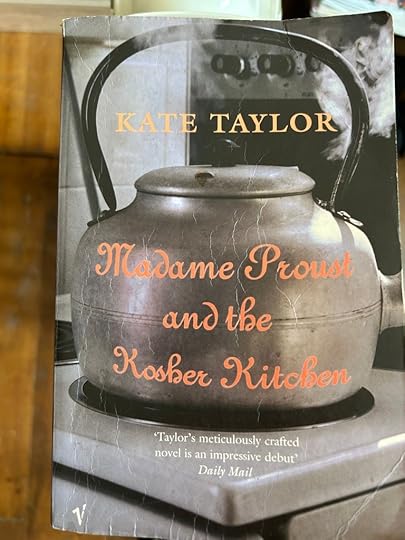
As an ardent devotee of ‘In Search of Lost Time,’ Proust’s monumental novel of life, love, manners, mores and everything else in nineteenth-century France, I was attracted by the title of this novel. However, when I started to read it, with its implicit reference of the impending Shoah, I found myself wondering whether it would be worthwhile to continue. My perseverance paid off, however, and I soon found myself immersed in what seemed to be the diary entries kept by the woman who was Marcel Proust’s mother, describing the daily life of a bourgeois family, of whom the son, Marcel, was a constant source of worry, and sometimes even anguish.
The book by Kate Taylor consists of three main narrative strands: the aforesaid diary entries; the more modern-day saga of a twelve-year old girl, Sarah, sent from Nazi-occupied France to Canada, where she is taken into the home of a childless Jewish couple; and the contemporary life and unrequited love of a young Canadian woman who is undertaking research into the life of Marcel Proust in the national library of France in Paris.
The segments describing the diary purportedly kept by the mother of Marcel Proust accurately reflect known events and episodes in his life. Marcel Proust wrote by night and slept in the day in his cork-lined Paris apartment insulated against noise. Many of the details of Proust’s life — his tendency to suffer from attacks of asthma, his general sickliness, even hypochondria, his fascination with ‘high society’ and his financial excesses — are reflected in his mother’s anxious reports of his behaviour, and its effect on the family, and on her in particular. I found this beautifully-written segment utterly fascinating and even convincing.
The life of the refugee child Sarah and her adoptive parents in Ottawa is also interesting, though less enthralling. Her adolescence and eventual marriage to a respectable, rather orthodox Jewish man in Ottawa gives rise to the extremely detailed account of the dietary requirements of the kosher kitchen of the title, which I found rather tedious. Altogether, the strand involving Sarah and her unsteady psychological development arising from the trauma of the separation from and eventual loss of her parents, has a morbid fascination of its own, but tends to be more depressing.
The saga of the narrator’s doomed love for a young man who turns out, like Proust, to have been homosexual is another -rather confusing strand to the book, and the introduction of her professional experience as a simultaneous translator merely serves to add to the confusion, in my view.
The author provides an afternote in which she describes how she has invented the account of her experience in the national library and the creation of Madame Proust’s diary entries, arousing my admiration for her inventiveness and imagination.
Perhaps Kate Taylor has tried to pack too much into the confines of a single novel, though the parallels between the lives of Sarah, the narrator and Marcel Proust’s mother are interesting, albeit somewhat far-fetched. Loving someone who is unattainable or whose character is impenetrable is always difficult, and that seems to have been the fate of most of the characters in this book which, despite my reservations, is definitely worth reading.
July 25, 2024
What Will Become of Us?

Every Saturday evening a couple of hundred people gather on the nearby bridge that spans the main Jerusalem-Tel Aviv highway. Flags and banners flutter in the breeze and Israeli songs are piped over the loudspeaker system until someone addresses the crowd, makes a short speech repeating our demand for a ceasefire in the war in Gaza and the immediate return of the hostages. This concludes with the reading out of the names of each and every hostage, whereupon we all shout ‘Bring them home now!’ Then, under the watchful eye of the police, the barricades are removed, we stand in the road and sing ‘Hatikva,’ then disperse to our comfortable homes.
There is no violence. No roads are blocked until the end, when this is done very briefly with the permission of the police. Many of the participants are elderly people, like myself. There is a spirit of friendship that seems to create a bond between like-minded individuals, even though most of them are complete strangers to one another.
Vehicles go past on the road that separates the pavements on either side of the bridge, and many of the drivers tootle their horns to indicate their support. The atmosphere is calm, subdued even, and no one seems to get agitated or upset. If anything, there is a general air of depressed resignation to a situation that we know we cannot change. We do what we can to express our disagreement with the way the government is running things, but we know that in reality nothing we do will have any effect and our protests fall on deaf ears.
But last week something happened which has left me in shock. I haven’t spoken to any of the other demonstrators about it, so don’t know if anything was done about it, or if anyone intends to do anything in the future.
A car stopped and a voice shouted: “Nazis! Nazis! Go back to Germany!” I couldn’t see the car or the driver so I don’t know whether anyone said or did anything in response. It seemed to me that the car simply moved on, because the traffic continued to flow. No one spoke about the event, but the sound of that voice continues to echo in my mind and haunt me.
“Jews, go home! Go back to your own country!” was the taunt that my people heard for all the long years that we had no country of our own. In Israel it is illegal to call anyone ‘Nazi,’ knowing what that epithet entails. The crimes perpetrated by the Nazis are still fresh in our collective memory.
On what depths of hatred did that man draw in order to hurl that epithet against people who were peacefully exercising their legitimate right to demonstrate in the democratic country we call Israel? I am starting to fear that the forces that are engendering that enmity towards different segments of the population will gather strength and succeed in turning what was once an enlightened liberal democracy into something else, something dark and vengeful, based on chauvinism, messianism and repression. God help us if that happens.
July 19, 2024
Bearing Witness: Documenting 7th October and its Aftermath
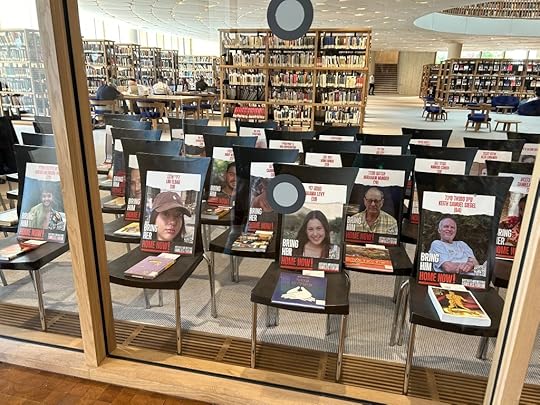
I jumped on the opportunity to take another guided tour of the splendid new National Library building in Jerusalem (this time in the framework of IAWE, the Israel Association of Writers in English). The twenty or so assorted individuals who gathered in the café (dubbed Harry’s Café, but no one told us who Harry was) were summoned to the gathering point, equipped with audio apparatus and set off on our tour.
Our guide was at pains to give us information about the establishment and history of the Library, which was founded as the B’nai Brith Library in Jerusalem in the early 1920s, but existed even before that, having been thought up and brought into existence by a group of intellectuals in eastern Europe in 1892, when Jews were asked to send books to Jerusalem to serve as a repository of Jewish culture and knowledge.
From 1925, when the Hebrew University was established on Mount Scopus, the library, known then as the Jewish National and University Library, was situated there. This situation continued until 1948, when Mount Scopus, with all its buildings, became part of Jordan. During that time books were occasionally smuggled out of the old library building into the new one, situated at the apex of the new Givat Ram campus of the Hebrew University, at the point where the buildings housing the Humanities and the Sciences met.
After 1967, when Mount Scopus was once again in Israel’s hands, the Hebrew University reclaimed its buildings on the mountain-top campus, although leaving the Sciences departments on the Givat Ram campus.
Early on in the development of the State of Israel the government designated the area of Jerusalem known as Givat Ram as the site where government buildings, the Knesset, the Hebrew University and several museums would be situated. In 2008 the project to construct a new home for the National Library (now no longer part of the Hebrew University) was launched, and Swiss architects, Herzog and de Meuron were chosen to design the building, which was inaugurated in October 2023, albeit with less fanfare than originally intended due to the Hamas attacks of 7th October that year.
Since the role of the Library is to preserve the collective memory of the Jewish people and the State of Israel, it has taken it upon itself to gather, document and preserve any and all material related to that horrific event and the subsequent war. The project is called ‘Bearing Witness,’ and employs several people in the unit set up in order to collect and document the material in its various shapes and forms. It is a collaborative national and global effort aimed at documenting October 7th and its aftermath, both in Israel and in Jewish communities around the world.
Our group sat in stupefied silence as we were given the facts and figures delineating the many thousands of filmed, written and photographic items of evidence of that dreadful event. I personally was torn between being full of admiration for the effort and feeling sickened by the detached way in which we were presented with the cold numbers regarding pieces of evidence. Thus was our collective trauma transmuted into impersonal facts and figures. But then one of our group pointed out that at the time of the Holocaust there were those, whether friend or foe, who amassed documentary evidence at the time, and how valuable all that is today.
The scope of the material is immense and unprecedented, providing a national memory database and enabling evidence-based historical research. The objective is to preserve these materials and make them available and accessible today and for future generations. It is a mammoth task, but one that is both unenviable and invaluable.
July 12, 2024
The Good Assassin: How a Mossad Agent and a Band of Survivors Hunted Down the Butcher of Latvia
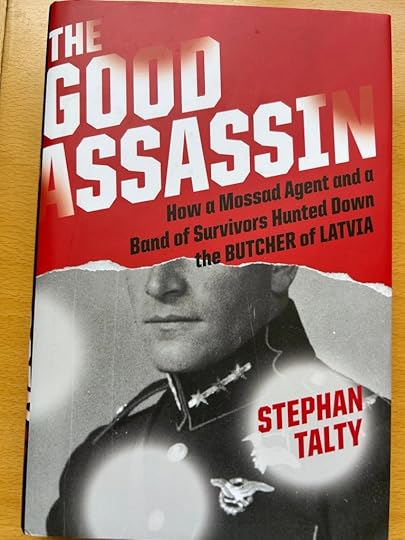
This book by Stephen Talty consists of three sections. The first gives a vivid account of Jewish life in pre-war Latvia, the exploits of pioneer-aviator Herbert Cukurs, the Russian occupation of the country followed by the German invasion, with the round-up and brutal murder of the Jewish population (this part should not be read by the faint-hearted), with the eager participation of the local population, including national hero Herbert Cukurs.
The second section contains a detailed and graphic description of the process many years later by which a Mossad agent gained the friendship and trust of Herbert Cukurs, who by then was living quietly in Brazil’s principal city, Rio de Janeiro, and managed to organise his assassination by a team of Mossad agents. Coming only a few years after the capture in Argentina of Adolf Eichmann and his trial and execution in Israel, it seems strange that Cukurs was not more circumspect about concealing his identity. The success of the operation can be explained by the ability of the Mossad agent to conceal his true identity and present himself as an innocuous Austrian businessman.
The third section describes the process by which the efforts of several groups, particularly Nazi-hunters Tuviah Friedman and Simon Wiesenthal, succeeded in blocking the legislation proposed by the West German Republic in 1965 to impose a statute of limitations on the prosecution of Nazi war criminals.
The author has done extensive research into every aspect of his three narratives, including a detailed index and several pages of notes at the end. He has interviewed many individuals, including some of the few Jewish survivors of the mass murders in and around Riga, Latvia’s capital city, and has studied documentary evidence recorded by them and others. He provides an astonishing and detailed account of the way in which a young Jewish woman was saved by a local resident who had fallen in love with her. The vicissitudes each of them suffered subsequently, whether individually or jointly, under Soviet rule, are harrowing to read. The knowledge that the young woman was able later to marry a Jewish man, bear two daughters, and eventually move to Israel provides the reader with some consolation.
The author must have had privileged access to Mossad documents and/or agents to be able to describe in such great detail precisely how the agent managed to gain Cukurs’ confidence to such an extent that, although suspicious of being traced by hostile Jewish elements, he agreed to fly to Montevideo in Uruguay, where the Mossad considered the conditions for assassinating him would be more favourable.
Finally, the author gives a detailed account of how the German legislation was proposed, the way Israel’s government rallied in order to prevent its ratification by the Bundestag, and the contribution made by the concerted efforts of Friedman and Wiesenthal. All these elements together achieved the objective of defeating the proposal on repeated occasions.
As a result of the blocking of the legislation, Germany’s prosecution team was considerably expanded, and many more Nazi criminals were brought to trial and imprisoned for varying periods of time. Furthermore, as a result of the assassination of Cukurs many former Nazis living in relative security in South America came to feel less secure, fearing that they would suffer a similar fate. Whether more assassinations were implemented is not clear. To answer that would require another well-written book based on intimate knowledge and extensive research.
July 4, 2024
Back to the Future?

Returning to Israel after some weeks travelling in Europe inspires a complex mixture of feelings, some uplifting, others depressing. To say that we’re confused would be an understatement.
As our plane nears Israel in the afternoon the clouds clear away to reveal the city of Tel Aviv with its white buildings and broad avenues glittering in the sunlight. The look of joy and awe on the face of the passenger in the seat in front of me as she gazed out of the window reminded me just how much love has been lavished on creating and maintaining this country, which I have chosen to make my home.
But so many things have gone wrong. The country is at war, and the current political situation seems to preclude any positive solution. Many public services are not functioning well and a general sense of malaise seems to hang over everything.
The war that is being waged in Israel is against an enemy whose sole ideology is to wipe the country and its Jewish population off the map, and that grim reality cannot be avoided or ignored. But while soldiers are being killed on an almost daily basis, progress towards the vaunted ‘total victory’ does not seem to be coming any nearer. Calls for some form of ceasefire and – primarily – the return of the hostages appear to fall on deaf governmental ears. Demands for a fresh election because the current government has failed in its job of protecting the country and seems bent on undermining the principles of liberty and tolerance on which the country was founded also go unheeded. In addition, because of political considerations the government continues to channel excessive resources to segments of the population which refuse to serve in the army or contribute to the economy by working
But at least it is still possible to issue those calls, and to stand together to demonstrate for change. Some of the demonstrations have been subjected to police violence in an attempt to dissuade people from exercising their democratic right. That is another ominous cloud on the horizon. The predicament of many thousands of Israelis forced to abandon their homes on the northern border seems to be no nearer solution as Hizbollah continues to rain rockets on the region, and that is another cause for concern.
But coming back to Israel also has its positive side. First of all, it’s our home, and it is here that our friends and family live. In addition, there is endless sunshine (sometimes even too much of it), providing light and energy gratis for all. Israel’s beaches and open spaces as well as the well-stocked and air-conditioned shopping malls provide sanctuaries of relief from the heat. The intensified sense of solidarity aroused by the October attack and the subsequent hostilities in the north has not subsided, and there is a palpable sense of friendly forbearance among people waiting in line at the supermarket check-out.
We can’t help wondering what would have happened had Israel not come into existence. Would there be more or less antisemitism in the world without Israel? What does the future hold for Israel and for Jews in the diaspora? Are we going to see a repeat of the events of the mid-twentieth century? The very thought is frightening. The current rise of antisemitism worldwide is undoubtedly a cause for concern for all Jews everywhere. All I can say is that without Israel every Jew everywhere would be even more vulnerable than they already are. And that alone is sufficient to justify Israel’s existence. Because, for all its faults Israel is a sovereign state with the capacity, ability and right to defend itself.
June 21, 2024
Travels in Search of the Unattainable
When we left Israel, over two weeks ago, we hoped to be able to escape the heavy cloud hanging over us since the vile assault on Israel on 7th October and the subsequent war in Gaza and fighting in the north. Spending time with friends, first in the Netherlands and later in Leipzig, where a friend from England was singing in a choir as part of the Bach Festival there, certainly helped to distract us, but in the modern world of instant communications there’s no escaping the knowledge of the dire situation in our homeland.
Wherever we went we found hospitable friends as well as kind and friendly strangers, not to mention the cultural, artistic and musical delights of Europe. It’s difficult to pinpoint any particular highlight, whether it be the fabulous Kroller-Muller museum in the heart of the Netherlands, the fascinating Sans-Souci palace built in Potsdam by King Friedrich II of Prussia for his private enjoyment and intellectual pleasure, and the temporary exhibition of portraits by Modigliani in the Barberini Museum, also in Potsdam.
As inveterate music-lovers who rarely let a week go by without attending at least one concert when we’re at home in Israel, our stay in Leipzig to coincide with the annual Bach Festival there was an unforgettable experience. Bach lived and worked there for most of his adult life, during which he produced countless musical works of genius. We were able to attend an unforgettable performance of his St. Matthew Passion in the St. Thomas Church, where Bach was in charge of the music performed there on a weekly basis, and most of which he composed to order. In addition we attended two performanccs of Bach cantatas given by visiting choirs, one of them from Southport, England in which a friend from my time at university participated. The choir that sang in the St. Matthew Passion was from Bethlehem, Pennsylvania, and both choirs did an excellent job even though they had to sing in German.
Another delight of travelling is being able to enjoy food cooked by someone else, and when we could do this in the company of friends, that added to the pleasure. We were able to enjoy the delicacies prepared by our friends in the Netherlands and share two interesting meals in Leipzig with our friend from Southport, and on one occasion were even joined by members of her family who had come to hear her sing. That really was a lot of fun.
Leipzig was also home to several other composers and musicians, and we were able to tour the former homes of Clara and Robert Schumann as well as that of Felix Mendelssohn, using spiffing up-to-date interactive systems to listen to items of information and pieces of music.
And now we are in our French home and have been welcomed by friends here with ‘aperos’ and an introduction to a recently-established English-Scottish tea-room where scones and tea are readily available. It is good to know that for the next two weeks we won’t be going away again until we return to Israel to face the grim reality there. But we will be glad to be near our nearest and dearest once more, and look forward to being together with them again sitting in our comfortable Jerusalem home.
June 11, 2024
Leipzig—city of Music
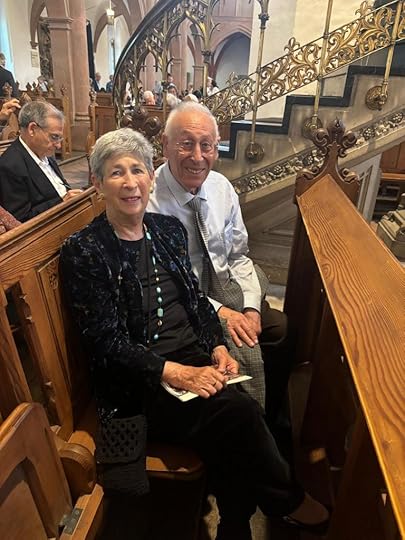
Every few years, when we visit London, I try to meet up with three special friends who were students with me at the LSE back in the early sixties. At our last meeting, just over a year ago, I happened to ask one of them, who now lives in the north of England and had come to London for our get-together, whether she still sang n a choir, as she had in our student days. At that time I sang in the university’s very amateur choir while she sang in the prestigious London Bach Choir.
”Yes,” she replied with evident enthusiasm, “and we’re going to sing in the Bach Festival in Leipzig, Germany next June.” Wham! Yigal and I looked at one another across the dinner table in the lovely restaurant where we were meeting our friends, and we knew, without saying another word, that we would be in Leipzig next June.
And now, here we are, going to wonderful choral concerts in the very church where Bach played his music (with its wonderful acoustics), enjoying music at every turn, where visiting choirs from fourteen different countries (including one from Bethlehem, Pennsylvania) stand and sing out their songs on street corners and market squares, bringing delight to all and sundry. We heard a stellar performance of Bach’s St. Matthew Passion, and emerged three hours later drunk with music. We happened to pass by the Gewandhaus just as a recital for harpsichord and violin by Bach was beginning, and managed to get in just in time. Yesterday we heard a choral concert of three Bach church cantatas, with choral singing by the choir, in which some audience members joined in. And tomorrow we will be attending the concert given by the choir in which my friend Valerie’s choir from Southport, England, is singing, in another church.
In addition, yesterday we toured the museum set up in the house where Mendelssohn lived, and later today we hope to get to the museum in the house where Schumann lived. There is also a Bach Museum in the town, which we hope to visit.
Leipzig is a friendly city, full of music, restaurants, churches and music-lovers. What’s not to enjoy?

